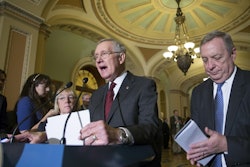MORNING-11
just out this morning.>
products labeled natural but nearly two-thirds believe natural means more
than it does. And ".for processed foods, the label offers no clear
meaning." Urvashi Rangan is the director of Consumer Safety and
Sustainability at Consumer Reports and joins us at the table.>
Sustainability>
GAYLE KING: Consumer Reports takes on natural food labeling and the story that`s just out this morning. The magazine survey found more than sixty percent of Americans buy products labeled natural but nearly two-thirds believe natural means more than it does. And ".for processed foods, the label offers no clear meaning." Urvashi Rangan is the director of Consumer Safety and Sustainability at Consumer Reports and joins us at the table. Because I`m thinking, good to see you, Urvashi.
URVASHI RANGAN (Consumer Reports Consumer Safety and Sustainability): Thanks, Gayle. You, too.
GAYLE KING: I feel that we have heard this before and you said, yeah, we have but--
URVASHI RANGAN: We have but what`s new now is that the Food and Drug Administration is finally going to open up a comment period and hear what the public has to stay about this problem.
GAYLE KING: So natural it says natural but doesn`t always mean natural.
URVASHI RANGAN: That`s right. Natural doesn`t always mean natural and, in fact, the consumers think that it means a lot more. In fact they think it means no artificial ingredients or colors. No GMOs, for example. No pesticides. For meat they think it means no drugs that the animals were raised outside and led some sort of natural life.
GAYLE KING: Mm-Hm.
URVASHI RANGAN: And it doesn`t mean any of this.
NORAH O`DONNELL: Okay, what are some examples of products that are labeled natural that may not be so?
URVASHI RANGAN: In our Consumer Reports story out today we feature seven different products and February will be a month of products that we`re going to feature. The first product is Del Monte Fruit Naturals, which contains artificial preservatives like sodium benzoate, for example, straight out artificial.
GAYLE KING: I like those. Yeah. I like those.
URVASHI RANGAN: Straight out artificial.
NORAH O`DONNELL: Really?
URVASHI RANGAN: But you can use a natural label. Another product that we feature is Wesson oil. Wesson oil is often soybean or canola or vegetable oil. Those things are often derived from genetically modified crops but most consumers don`t think there should be GMOs in natural labeled products. Finally we feature a root beer that has a caramel color. But all colors are considered artificial by the Food and Drug Administration.
CHARLIE ROSE: So, therefore, let me read you this: We reached out to the company`s ConAgra says promoting their Wesson oil as natural is consistent with applicable laws and FDA regulations. James (INDISTINCT) says the coloring for their root beer comes from natural ingredients and Del Monte has not responded. Who ultimately decides what isn`t?
URVASHI RANGAN: That`s right. I mean part of it is there aren`t very many laws or regulations to it. Of course there`s nothing on the books when it comes to the Food and Drug Administration. And what`s interesting is they do consider all colors to be artificial. We`re not saying these products are doing anything illegal, what we`re saying is the lack of government standards allows companies to label in a misleading way and we`ve been able to document that the majority of consumers are being misled on the market.
CHARLIE ROSE: So you want tougher standards from the government?
URVASHI RANGAN: That`s right. We either want them to ban it altogether if they don`t have the will to define it or define it so it`s so meaningful that it cannot mislead consumers.
GAYLE KING: It`s a little unsettling to know anybody can just say it`s natural when it`s not. So how as a consumer do you know this really is natural?
URVASHI RANGAN: That`s exactly right. And as opposed to organic, for example, which has hundreds of pages of standards and is verified it`s not perfect but it has that.
GAYLE KING: Mm-Hm.
URVASHI RANGAN: Natural doesn`t require any of those things, yet, nearly half of people think it`s verified. More than two-thirds think it`s no GMOs, no pesticides, no artificial ingredients.
NORAH O`DONNELL: And, in fact, your own poll found that eighty-seven percent of people who buy natural products would pay more, if their expectations were met. So this should be something that the food industry wants to meet.
URVASHI RANGAN: Norah, that`s absolutely right. This can be a win-win for everyone. The fact of the matter is that-- that people want better food, better food production practices but they want labels that stack up to those expectations.
CHARLIE ROSE: And you would hope that the best companies would want the same thing?
URVASHI RANGAN: That`s exactly right. We know some companies out there have even taken the natural label off their products.
CHARLIE ROSE: Thanks, Urvashi.
NORAH O`DONNELL: Thank you.
URVASHI RANGAN: Thank you.
GAYLE KING: Chelsea Handler led a late night comedy insurgency. Now she takes on the bittersweet moments of her life. That`s ahead.
(ANNOUNCEMENTS)
*************************************************************************** ** (8:30 AM, EDT)
END
(Copy: Content and programming Copyright MMXVI CBS Broadcasting Inc. ALL RIGHTS RESERVED. Copyright 2016 CQ-Roll Call, Inc. All materials herein are protected by United States copyright law and may not be reproduced, distributed, transmitted, displayed, published or broadcast without the prior written permission of CQ-Roll Call. You may not alter or remove any trademark, copyright or other notice from copies of the content.)






















